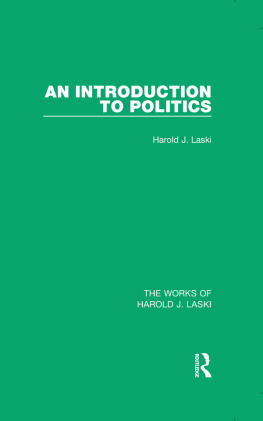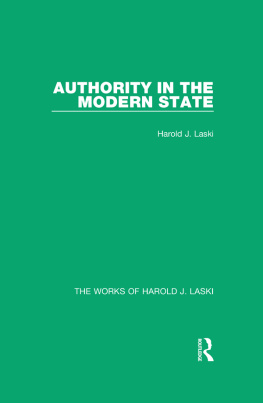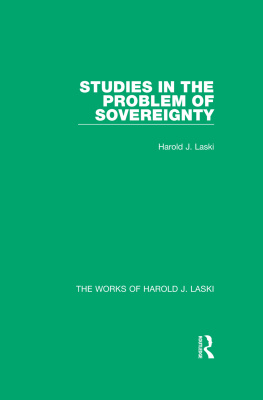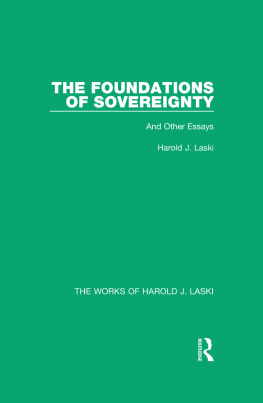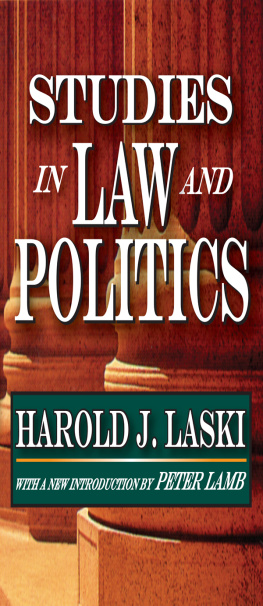THE WORKS OF HAROLD J. LASKI
Volume 6
AN INTRODUCTION TO POLITICS
First published in 1931
This edition first published in 2015
by Routledge
2 Park Square, Milton Park, Abingdon, Oxon, OX14 4RN
and by Routledge
711 Third Avenue, New York, NY 10017
Routledge is an imprint of the Taylor & Francis Group, an informa business
1931, 1951, 1961 George Allen & Unwin (Publishers) Ltd
All rights reserved. No part of this book may be reprinted or reproduced or utilised in any form or by any electronic, mechanical, or other means, now known or hereafter invented, including photocopying and recording, or in any information storage or retrieval system, without permission in writing from the publishers.
Trademark notice: Product or corporate names may be trademarks or registered trademarks, and are used only for identification and explanation without intent to infringe.
British Library Cataloguing in Publication Data
A catalogue record for this book is available from the British Library
ISBN: 978-1-138-81912-2 (Set)
eISBN: 978-1-315-74273-1 (Set)
ISBN: 978-1-138-82201-6 (Volume 6)
eISBN: 978-1-315-74263-2 (Volume 6)
Publishers Note
The publisher has gone to great lengths to ensure the quality of this reprint but points out that some imperfections in the original copies may be apparent.
Disclaimer
The publisher has made every effort to trace copyright holders and would welcome correspondence from those they have been unable to trace.
George Allen & Unwin (Publishers) Ltd, 1931, 1951, 1961
This book is copyright under the Berne Convention. No reproduction
without permission. All rights reserved.
George Allen & Unwin (Publishers) Ltd,
40 Museum Street, London WC1A 1LU, UK
George Allen & Unwin (Publishers) Ltd,
Park Lane, Hemel Hempstead, Herts HP2 4TE, UK
Allen & Unwin Inc.,
9 Winchester Terrace, Winchester, Mass 01890, USA
George Allen & Unwin Australia Pty Ltd,
8 Napier Street, North Sydney, NSW 2060, Australia
First published in 1931
First published this edition 1961
Ninth impression 1981
0 04 320020 6
TO JAN AND TONIA
Professor Laski wrote this book in 1930 not only as a popular introduction to the subject but also as an encouragement to the average reader to explore the classical texts, or even his own fuller exposition, Grammar of Politics.
It was revised and brought up to date in the spirit of the original edition in 1951 by Martin Wight, with the help of Ralph Miliband, a friend and colleague of Professor Laski, and Geoffrey Goodwin.
CONTENTS
I
EVERY citizen of the modern world is the subject of a state. He is legally bound to qbey its orders, and the contours of his life are set by the norms that it imposes. These norms are the law, and it is in the power to enforce them upon all who live within its boundaries that the essence of the state is to be found. For whereas all other associations are voluntary in character, and can bind the individual only as he chooses membership of them, once he is a resident of some given state, legally he has no choice but to obey its commands. These are superior in their legal claim to the demand upon him of any alternative body. The state, so to say, is the crowning-point of the modern social edifice, and it is in its supremacy over all other forms of social grouping that its special nature is to be found.
The state is thus a way of regulating human conduct. Any analysis of its character reveals it as a method of imposing principles of behaviour by which men must regulate their lives. The state orders us not to steal; it punishes us for a violation of its order. It lays down a system of imperatives, and uses coercion to secure obedience to them. From its own standpoint, the validity of those imperatives is self-derived. They are legal, not because they are good, or just, or wise, but because they are its imperatives. They are the legal expression of the way in which men should act as laid down by the authority which is alone competent to make final decisions of this kind.
But legal imperatives neither state themselves nor are self-enforced. They have been willed by some man, or some body of men, and by some man or some body of men they must be enforced. When we examine the states of the modern world, we find that they always present the spectacle of a large number of men obeying, within a defined territory, a small number of other men. We find, also, that the rules made by this small number, whether, as in Great Britain, they are omnicompetent (the King in Parliament) or, as in the United States, are limited both as to the subject-matter about which they can command obedience and the methods by which this is achieved, nevertheless possess this quality that, should they be violated, this small number of men can use all the coercion that is necessary to vindicate their authority. Every state, in short, is a territorial society divided into government and subjects, the government being a body of persons within the state who apply the legal imperatives upon which the state rests; and, differently from any other body of persons within the territorial society, they are entitled to use coercion to see that these imperatives are obeyed.
In every state, this is to say, there is a will which is legally pre-eminent over all other wills It makes the final determinations of the society It is, in the technical phrase, a sovereign will. It neither receives orders from any other will, nor can it finally alienate its authority. Such a will, for example, is that of the King in Parliament in Great Britain. Within the confines of its territory, whatever it decides is binding upon all residents within that territory. They may consider its decisions immoral or unwise; they are nevertheless legally bound to obey them. A British subject who disliked some decision of his church might leave his church; it would be unable to enforce his acceptance of its decision. But a British subject who disliked the law relating to the income-tax would nevertheless be legally bound to obey it. His attempt to challenge ks efficacy would be met at once by compulsory subjection, in one form or another, to its consequences.
The state is thus a society of individuals submitted, if necessary, by compulsion, to a certain way of life. All conduct in the society must conform to that way. The rules which settle its character are the laws of the state, and, by an obvious logic, they have necessary primacy, are, that is to say, sovereign, over all other rules. In this society, the individuals who make and enforce the rules are termed the government; and that portion of the rules which settles (a) how such rules are to be made (b) the manner in which they are to be changed (c) who are to make them, is called the constitution of the state.
II
This is, of course, to view the state as a purely legal order. It is simply a description of the way in which social relationships are geared together in a modern community, without regard either to the way in which the present system has developed, the purposes that it serves, or the value and dangers which attach to it as it functions.
Obviously enough, all of these are important. The character of the modern state is the consequence of the history through which it has passed, and it would be unintelligible save in the light of that history. The power of the state is not exerted in a vacuum. It is used to achieve certain ends, and its rules are, in their substance, altered to secure the ends deemed good at some particular time by those in possession of the legal right to operate its power. Our sense, again, of the value and dangers of the state as thus conceived will clearly depend very largely upon our view of the ends it is seeking to serve, and the way in which it seeks to serve them.


